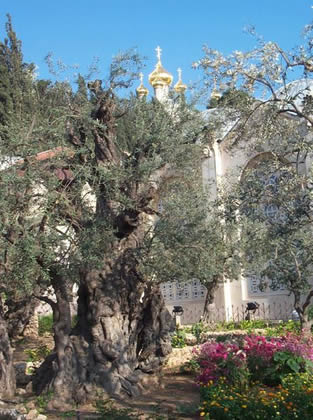| "For the word of the Lord is truth, and whatsoever is truth is light..." |
Gethsemane by S. Kend Brown by S. Kend Brown
The name Gethsemane (derived from Hebrew "oil press") is mentioned twice in the Bible, both in the New Testament (Matt. 26:36; Mark 14:32); in each case, it is called a "place" (Greek chorion, "piece of land") to which Jesus Christ and his apostles retired after their last supper together. The fourth gospel calls the area "a garden" (John 18:1). For Latter-day Saints, Gethsemane was the scene of Jesus' greatest agony, even surpassing that which he suffered on the cross, an understanding supported by Mark's description of Jesus' experience (Mark 14:33-39). According to Luke 22:43-44, Jesus' anguish was so deep that "his sweat was as it were great drops of blood falling down to the ground," an observation that harmonizes with the view that Jesus suffered most in Gethsemane during his Atonement. Even though these verses are missing in some of the earliest extant manuscripts of Luke's gospel, their content is confirmed in modern revelation (e.g., D&C 19:18). The evidence for Jesus' extreme agony in Gethsemane is buttressed by a prophecy in the Book of Mormon and a statement by the resurrected Savior recorded in the Doctrine and Covenants. About 125 B.C., a Book of Mormon king, Benjamin, recounted in an important address a prophecy of the coming messiah spoken to him by an angel during the previous night. Concerning the Messiah's mortal experience, the angel declared that "he shall suffer temptations, and pain of body, hunger, thirst, and fatigue, even more than man can suffer, except it be unto death; for behold, blood cometh from every pore, so great shall be his anguish for the wickedness and the abominations of his people" (Mosiah 3:7). The Doctrine and Covenants gives the following poignant words of the resurrected Jesus: "Behold, I, God, have suffered these things for all, that they might not suffer if they would repent; …which suffering caused myself, even God, the greatest of all, to tremble because of pain, and to bleed at every pore, and to suffer both body and spirit" (D&C 19:16, 18). Modern LDS leaders have emphasized that Jesus' most challenging experience came in Gethsemane. Speaking in a general conference of the Church in 1982, Marion G. Romney, a member of the First Presidency, observed that Jesus suffered "the pains of all men, which he did, principally, in Gethsemane, the scene of his great agony" (Ensign 12 [May 1982]:6). Church President Ezra Taft Benson wrote that "it was in Gethsemane that Jesus took on Himself the sins of the world, in Gethsemane that His pain was equivalent to the cumulative burden of all men, in Gethsemane that He descended below all things so that all could repent and come to Him" (Benson, p. 7). While tradition locates Gethsemane on the lower slopes of the Mount of Olives, the exact spot remains unknown. Luke associates it with the Mount of Olives (Luke 22:39), and John notes that it lay across the Kidron brook (John 18:1), which flows from the north along Jerusalem's east side. The particular use of "place" (Greek topos) to describe the spot in the gospels of Luke and John suggests that the location was bound up with Jesus' destiny and consequently possesses a sacred character (Luke 22:40; John 18:2). It was a spot that Jesus and his disciples customarily visited (Luke 22:39), which allowed Judas and the others to find him on the night of his arrest (John 18:2). Bibliography Benson, Ezra Taft. Come Unto Christ. Salt Lake City, 1983. Maxwell, Neal A. "The New Testament—A Matchless Portrait of the Savior." Ensign 16 (Dec. 1986):20-27. Wilkinson, John. Jerusalem as Jesus Knew It, pp. 125-31. London, 1978.
|
|
|
Encyclopedia of Mormonism, Vol. 2, Gethsemane Copyright © 1992 by Macmillan Publishing Company Image used with permission under the GNU license agreement.
|
|